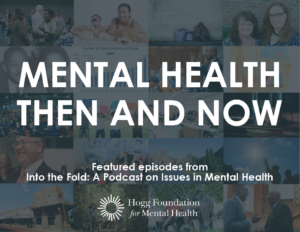 Recently, the Hogg Foundation published the 100th episode of our podcast, Into the Fold: Issues in Mental Health. Launched in 2014, the podcast served as a new way to share the human implications of our grantmaking, and the experiences related to mental health broadly. Through interviews and thought-provoking dialogue, the podcast also highlights the challenges and achievements of mental health advocates, policymakers, service providers, researchers, persons with lived experience, and foundation staff.
Recently, the Hogg Foundation published the 100th episode of our podcast, Into the Fold: Issues in Mental Health. Launched in 2014, the podcast served as a new way to share the human implications of our grantmaking, and the experiences related to mental health broadly. Through interviews and thought-provoking dialogue, the podcast also highlights the challenges and achievements of mental health advocates, policymakers, service providers, researchers, persons with lived experience, and foundation staff.
Today we continue our blog series showcasing a variety of our favorite podcast episodes. Check out others in this series for conversations about the impact of our everyday systems on well-being, belonging and inclusion, recovery and community well-being. Stay tuned for our final post highlighting episodes related to the theme of Wisdom for Today.
Note: Short on time? A written summary is provided for most of our podcast episodes.
Start Listening: Mental Health Then and Now
The Hogg Foundation is almost 80 years old. However, there is much about our current focus on the community conditions that support or erode mental health that would be recognizable to earlier generations of Hogg Foundation leadership, staff and allies. As we explain on our History webpage, the foundation has long argued that mental health is relevant to situations of everyday life, such as family relations, schools, workplaces and faith settings. The foundation was founded on these principles and we continue to live that vision today.
But our understanding of mental health, and the foundation’s role in shaping that understanding, has evolved over time. In these episodes, experts look at the work of the Hogg Foundation through a historic lens, making connections between the past and present of mental health in Texas.
- Episode 43: What is Mental Health Becoming?
Ken Thompson, clinical associate professor of psychology at the University of Pittsburgh and member of the foundation’s National Advisory Council, helps make sense of how societal perceptions of mental health, and the options available for influencing it, have changed over time. - Episode 11: The Central Lunatic Asylum for Colored Insane
Patricia Galloway, digital archivist in the School of Information at The University of Texas at Austin, discusses the monumental effort to digitally preserve patient records from the segregation-era Central Lunatic Asylum for Colored Insane—the first mental hospital for newly freed slaves in the United States of America. - Episode 33: Nightmare at Noon—The UT Tower Shooting
The foundation’s offices were located in The University of Texas at Austin tower when the infamous Charles Whitman shooting occurred in 1966. Hear an employee’s first-person account of the shooting and the mental health questions that arose after this historic tragedy. - Episode 25: Circuit Riders for Mental Health
William S. Bush is a professor of history at Texas A&M University-San Antonio and author of “Circuit Riders for Mental Health: The Hogg Foundation and the Transformation for Mental Health in Texas.” Bush shares his thoughts on what his researched history reveals about the foundation, and the inspiration for the title. - Episode 21: Preserving Hogg History
Elizabeth Stauber, the foundation’s Archivist and Records Manager, oversees its historic preservation. She discusses the evolution of her role, and makes a case for the importance of archival standards in philanthropy.
New to the show? Subscribe to the podcast email to receive a notification in your inbox each time we have a new episode. Happy listening!
